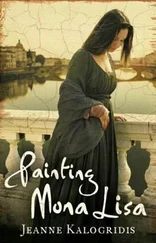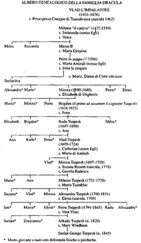At the time, she was in the midst of her fourth decade, an imposing figure: large boned, stout, broad of hip and jaw. Her raven hair, heavily streaked with grey, was pulled back tautly beneath a dark veil; she wore the black dress of perpetual mourning, though her husband had died almost a quarter of a century before, a young soldier in Ferrante’s army. Afterwards, Donna Esmeralda had become devoutly religious; a gold crucifix rested upon her prominent bosom.
She had never had children. And while she had never taken to my father-indeed, she could scarcely hide her contempt for him-when Trusia gave birth to me, Esmeralda behaved as though I was her own daughter.
Although she loved me, and tried her best to protect me, my behaviour always prompted her reproach. She would narrow her eyes, lips tugged downward with disapproval, and shake her head. ‘Why can you not behave like your brother?’
That question never hurt; I loved my brother. In fact, I wished to be more like him and my mother, but I could not repress what I was. Then Esmeralda would make the statement that cut deeply.
‘As bad as your father was at that age…’
In the great dining hall, I looked back at my little brother and said, ‘Father will never know. Look at them…’ I gestured at the adults, laughing and dancing. ‘No one will notice I’m gone.’ I paused. ‘How can you stand it, Alfonso? Don’t you want to know if it is true?’
‘No,’ he answered soberly.
‘Why not?’
‘Because it might be.’
I did not understand until later what he meant. Instead, I gave him a look of frustration, then, with a whirl of my green silk skirts, turned and threaded my way through the throng.
Unseen, I slipped beneath the archway and its grand tapestry of gold and blue. I believed myself to be the only one to escape the party; I was wrong.
To my surprise, the huge panelled door to the King’s throne room stood barely ajar, as if someone had meant to close it but had not quite succeeded. I quietly pulled it open just enough to permit my entry, then shut it behind me.
The room was empty, since the guards were busy eyeing their charges out in the Great Hall. Though not quite as imposing as the Hall in size, the room inspired respect: against the central wall sat Ferrante’s throne: a structure of ornately carved dark wood cushioned in crimson velvet, set upon a short dais with two steps. Above it, a canopy bore Naples’ insignia of the lilies, and on either side, arched windows stretched from floor to ceiling, framing a glorious view of the bay. Sunlight streamed through the unshuttered windows, reflecting off the white marble floors and the whitewashed walls, giving a dazzling, airy effect.
It seemed too open, too bright a place to hold any secrets. I paused for a moment, examining my surroundings, my exhilaration and dread both growing. I was afraid-but, as always, my curiosity overpowered my fear.
I faced the door leading to my grandfather’s private apartments.
I had entered them only once before, a few years earlier when Ferrante was stricken by a dangerous fever. Convinced he was dying, his doctors summoned the family to make their farewells. I was not sure the King would even remember me-but he had laid his hand on my head and graced me with a smile.
I had been astonished. For my entire life, he had greeted me and my brother perfunctorily, then looked away, his gaze distant, troubled by more important matters. He was not given to socializing, but I caught him at odd moments watching his children and grandchildren with sharp eyes, judging, weighing, missing no detail. His manner was not unkind or rude, but distracted. When he spoke, even during the most social of family events, it was usually to my father, and then only of political affairs. His late marriage to Juana of Aragon, his third wife, had been a love match-he had no need to further his political advantage, to produce more heirs. But he’d long ago spent his lust; the King and Queen moved in separate circles and now spoke only when occasion demanded it.
When he had lain in his bed, supposedly dying, and put his hand upon my head and smiled, I had decided then that he was kind.
Back in the throne room, I drew a breath for courage, then moved swiftly toward Ferrante’s private chambers. I did not expect to find any dead men; my anxiety sprang from the consequences of my actions were I caught.
On the other side of the heavy throne room door, the sound of the revellers and music grew fainter; alone, I could hear the sweep of my silk skirts against marble.
Tentatively, I opened the door leading to the King’s outer chamber. I recognized the room, having passed this way when Ferrante had been sick. Here was an office, with four chairs, a large desk, tables, many sconces for late-night illumination, a map of Naples and the Papal States upon the wall. There was also a portrait of my great-grandfather Alfonso wearing the jewelled sword he had brought from Spain, which Ferrante had worn earlier in the Duomo.
Daringly, I pressed against walls, thinking of hidden compartments, of passageways; I scanned the marble floor for cracks that hinted at staircases leading down to dungeons, but found nothing.
I continued on through an archway into a second room furnished for the taking of private meals; here again, there was nothing of note.
All that remained was Ferrante’s bedchamber. This was sealed off by a heavy door. Squashing all thoughts of capture and punishment, I boldly opened it, and made my way into the most interior and private of the royal chambers.
Unlike the other bright, cheerful rooms, this one was oppressive and dark. The windows were covered with hangings of deep green velvet, blotting out the sun and the air. A large throw of the same green covered most of the bed, accompanied by numerous blankets of fur; apparently, Ferrante suffered from chills.
The chamber was fairly unadorned given the status of its resident. The only signs of grandeur were a golden bust of King Alfonso on the mantel, and gold candelabra flanking either side of the bed.
My gaze was drawn to an interior wall, where another door stood fully opened. Beyond it lay a small, windowless closet, outfitted with a wooden altar, candles, rosary, a statuette of San Gennaro, and a cushioned prayer bench.
Yet at the termination of that tiny chamber, past the humble altar, was another portal-this one closed. It led further inward, its edges limned with a faint, flickering light.
I experienced excitement mixed with dread. Had the maidservant told the truth, then? I had seen death before. The extended royal family had suffered loss, and I had been paraded past the pale, posed bodies of infants, children, and adults. But the thought of what might lie beyond that interior door taxed my imagination. Would I find skeletons stacked atop each other? Mounds of decomposing flesh? Rows of coffins?
Or had the servant’s confession to my nursemaid sprung from a desire to keep the rumour alive?
My anticipation rose to near-unbearable levels. I passed quickly through the narrow altar room, and placed unsteady fingers on the bronze latch leading to the unknown. Unlike all the other doors, which were ten times my girlish width and four times my height, this one was scarcely large enough to admit a man. I pulled it open.
Only the cold arrogance conferred by my father’s blood allowed me to repress a shriek of terror.
Shrouded in gloom, the chamber did not easily reveal its dimensions. To my childish eyes, it seemed vast, limitless, due in part to the darkness of unfinished stone. Only three tapers lit the windowless walls: one some distance from me, and two on large iron sconces flanking the entrance.
Just beyond them, his face lit by the candles’ wavering golden glow, stood my welcoming host. Or rather, he did not stand, but was propped against a vertical beam extending just past the crown of his head. He wore a blue cape, attached to the shoulders of his gold tunic with fleur de lis medallions. At breast and hip, ropes bound him fast to his support. A wire connected to one arm raised it away from his body, and bent it out at the elbow, the palm turned slightly upward in a beckoning gesture.
Читать дальше
Конец ознакомительного отрывка
Купить книгу












